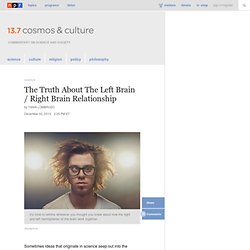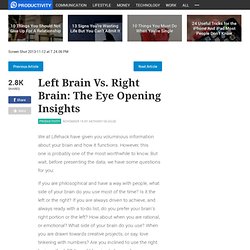

Hemispheric Asymmetry: What's Right and What's Left (Perspectives in Cognitive Neuroscience): Joseph B. Hellige: 9780674005594: Amazon.com. Left Brain, Right Brain: Perspectives From Cognitive Neuroscience (Series of Books in Psychology): Sally P. Springer, Georg Deutsch: 9780716731115: Amazon.com. Despite what you've been told, you aren't 'left-brained' or 'right-brained' From self-help and business success books to job applications and smartphone apps, the theory that the different halves of the human brain govern different skills and personality traits is a popular one.

No doubt at some point in your life you've been schooled on "left-brained" and "right-brained" thinking – that people who use the right side of their brains most are more creative, spontaneous and subjective, while those who tap the left side more are more logical, detail-oriented and analytical. Too bad it's not true. In a new two-year study published in the journal Plos One, University of Utah neuroscientists scanned the brains of more than 1,000 people, ages 7 to 29, while they were lying quietly or reading, measuring their functional lateralization – the specific mental processes taking place on each side of the brain.
Jeff Anderson, the study's lead author and a professor of neuroradiology at the University of Utah says: According to Anderson: An Evaluation of the Left-Brain vs. Right-Brain Hypothesis with Resting State Functional Connectivity Magnetic Resonance Imaging. Lateralized brain regions subserve functions such as language and visuospatial processing.

It has been conjectured that individuals may be left-brain dominant or right-brain dominant based on personality and cognitive style, but neuroimaging data has not provided clear evidence whether such phenotypic differences in the strength of left-dominant or right-dominant networks exist. We evaluated whether strongly lateralized connections covaried within the same individuals. Data were analyzed from publicly available resting state scans for 1011 individuals between the ages of 7 and 29. For each subject, functional lateralization was measured for each pair of 7266 regions covering the gray matter at 5-mm resolution as a difference in correlation before and after inverting images across the midsagittal plane. The difference in gray matter density between homotopic coordinates was used as a regressor to reduce the effect of structural asymmetries on functional lateralization. Figures Table 1.
How to Tap into the Right Side of Your Brain - Martha Beck Advice. The Truth About The Left Brain / Right Brain Relationship : 13.7: Cosmos And Culture. Hide captionIt's time to rethink whatever you thought you knew about how the right and left hemispheres of the brain work together. iStockphoto It's time to rethink whatever you thought you knew about how the right and left hemispheres of the brain work together.

Sometimes ideas that originate in science seep out into the broader culture and take on a life of their own. It's still common to hear people referred to as "anal," a Freudian idea that no longer has much currency in contemporary psychology. Ideas like black holes and quantum leaps play a metaphorical role that's only loosely tethered to their original scientific meanings.
What about the idea that some people are more right-brained and others more left-brained? Left Brain Vs. Right Brain: The Eye Opening Insights. We at Lifehack have given you voluminous information about your brain and how it functions.

However, this one is probably one of the most worthwhile to know. But wait, before presenting the data, we have some questions for you: If you are philosophical and have a way with people, what side of your brain do you use most of the time? Is it the left or the right? If you are always driven to achieve, and always ready with a to-do list, do you prefer your brain’s right portion or the left?
What is the relevance of this information, anyway?